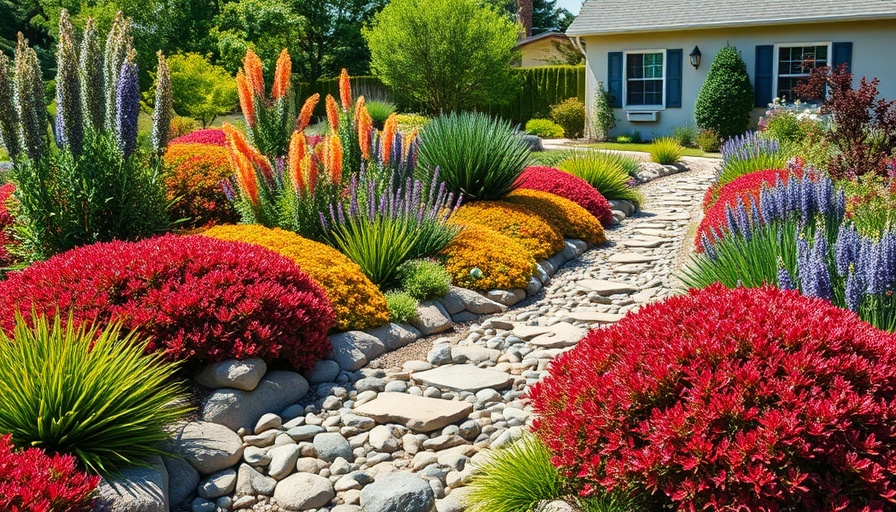
Transform Your Outdoor Space: The Importance of Native Gardening
Building a garden is often seen as a straightforward task — when in reality, it requires thoughtful consideration of the existing natural landscape. The landscape is not just a backdrop; it is a complex web of ecosystems that play a crucial role in supporting wildlife and maintaining biodiversity.
For anyone looking to create a garden without disturbing this delicate balance, embracing native plants is key. Native plants have evolved over thousands of years to thrive in their local conditions and support local pollinators, making gardens more sustainable and ecologically beneficial.
Understanding Local Flora: Research is Vital
To start on this journey, the first step is understanding which plants are native to your region. Identifying local flora is not just about choosing pretty flowers; it's about understanding the local ecosystem. These plants contribute significantly to local biodiversity and are typically low-maintenance as they are adapted to the local climate and soil conditions.
Resources such as the National Wildlife Federation’s Native Plant Finder or local botanical gardens offer invaluable insights into native species that can be included in your garden design. As Jordan Edwards, a renowned horticulturist, emphasizes, "Planting local species gives back to the ecosystem, providing habitats for the intricate network of insects, birds, and other wildlife that depend on them for survival. The right choices can transform your garden into a thriving sanctuary." The goal is to create a vibrant environment that flourishes with minimal intervention.
Observing Your Environment: The Key to Strategic Planting
Next, successful gardening at home entails careful observation of your environment. Elements such as sunlight, soil type, and moisture levels determine what plants will thrive in your garden. Spenser Thomas from Great Big Plants advises spending time outdoors to take note of sun patterns and soil conditions before planting.
Doing this helps garden enthusiasts select appropriate plant varieties that will flourish based on their specific conditions. For instance, selecting drought-resistant options for sunny locations and moisture-loving plants for shaded areas can maximize the garden’s potential.
Building a Community: The Social Value of Native Gardening
Gardening extends beyond aesthetics; it also fosters community connection. Many regions host gardeners’ clubs focused on promoting native plant gardening, enriching the local ecosystem, and providing educational resources. Joining one of these clubs can provide access to workshops, exchange opportunities, and even shared plots.
Moreover, witnessing neighbors embrace native gardening cultivates an environment of support and enthusiasm, which can often result in transforming entire neighborhoods into eco-friendly green spaces, improving not only property values but also community spirit.
Aligning with Seasonal Cycles for Effective Growth
Understanding seasonal patterns is crucial in promoting sustainable growth. The best gardening practices synchronize planting and maintenance schedules with the seasonal life cycles of local flora and fauna. For example, certain flowers provide critical nectar sources for bees and other pollinators during specific times of the year.
Implementing a planting schedule that aligns with these cycles not only nurtures the garden’s health but also boosts your local ecosystem's functionality. With expert advice and commitment, even novice gardeners can achieve stunning results that respect nature.
Future of Urban Gardening: A Path to Sustainability
As urban areas continue to expand, the demand for innovative gardening approaches that pay homage to nature grows. Homeowners are increasingly looking for sustainable ways to incorporate gardens into their properties, recognizing the significant ecological benefits of native plants.
Investing in eco-friendly gardening practices now can have profound effects on the future of biodiversity, water conservation, and pollution reduction. Creating a garden that harmonizes with nature reflects deep environmental responsibility and fosters a genuine connection to local ecosystems.
Now is the time to embrace the idea of gardening not merely as a hobby but as a potent tool for ecological change.
In conclusion, building a garden without disrupting nature is a highly rewarding endeavor. By focusing on native plants, community resources, seasonal growth patterns, and careful observation of one’s environment, anyone can create a flourishing space that benefits both homeowner and nature. Start your journey today, and transform your garden into a sanctuary for yourself and local wildlife.
 Add Row
Add Row  Add
Add 



Write A Comment